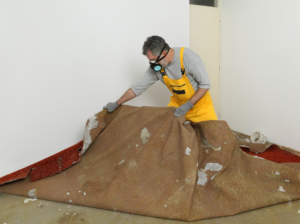For many homes and offices, carpets are a common and comfortable flooring favorite. They provide warmth, insulation, and a cozy atmosphere. What many homeowners don’t realize, however, is that dirty carpets can host a plethora of potential hazards that are detrimental to your health and the longevity of your flooring.
Neglecting to keep your carpets clean — or replace them when they’ve clearly surpassed their life expectancy — can lead to more dangerous and costly issues down the road.
Read on as we dive into the potential hazards related to dirty carpets, how they impact your health, and what you can do to maintain a clean and healthy living environment.
4 Health Hazards Related to Dirty Carpets
Check out the top four potential health problems caused by neglecting carpet cleanliness.
1. Respiratory Problems
Dirty carpets are a breeding ground for dust mites, allergens, and airborne particles.
Inhaling these contaminants can trigger or worsen respiratory conditions like asthma and allergies.
2. Bacterial Growth
Moisture, spills, and organic matter trapped in carpets create an ideal environment for bacteria to thrive. Harmful bacteria can lead to infections, skin irritations, and digestive issues if they come into contact with your skin or are ingested.
3. Mold and Mildew
Moisture trapped in carpets can lead to mold and mildew growth. Mold spores can become airborne and cause respiratory problems and other health issues when inhaled. Mold detection requires prompt action and professional remediation to ensure proper elimination.
4. Indoor Air Quality
Dirty carpets release pollutants into the indoor air, reducing the overall air quality in your home. Poor air quality can cause headaches, fatigue, and even contribute to long-term health problems.
The Between Carpet Bacteria and Illness
Studies have shown a direct link between dirty carpets and illness:
- Infections: Harmful bacteria and germs found in dirty carpets can cause skin, eye, and respiratory infections.
- Gastrointestinal Issues: Contaminated carpets can harbor E. coli and other pathogens that, when ingested, can lead to stomach issues and food poisoning.
- Allergic Reactions: Dust mites, pet dander, and mold spores trapped in carpets can trigger allergic reactions, including sneezing, itching, and congestion.
What Happens If You Don’t Wash Your Carpets?
Neglecting your carpet’s cleanliness can lead to several consequences:
- Unpleasant Odors: Odor-causing bacteria and mold can create persistent, unpleasant and stale smells in your living space.
- Rapid Wear and Tear: Dirt and grit accumulate over time, causing fibers to break down and the carpet to deteriorate prematurely.
- Costly Repairs: Extensive damage may require costly repairs or even complete carpet replacement.
How Often Should You Clean or Replace Your Carpet?
How often you clean or replace your carpet will depend on various factors, including:
- Foot Traffic
- Pets
- Personal Preferences
Cleaning
- High-traffic areas should be vacuumed at least once a week.
- Professional deep cleaning is recommended every 12-18 months for average use.
- Homes with pets or allergies may benefit from more frequent cleaning.
Replacing
- Carpet lifespan varies, but it’s generally expected to last 5-15 years.
- Signs that it’s time for replacement include extensive stains, irreparable damage, and a noticeable decline in appearance and comfort.
Don’t Neglect Your Carpet Cleanliness
Dirty carpets can pose significant dangers and hazards to your health and well-being. From respiratory problems to bacterial infections, the consequences of neglecting carpet cleanliness can be severe.
Regular cleaning and maintenance are necessary to ensure a clean and healthy living environment for you and your family. If you suspect that your carpet is causing health issues, or discover carpet mold and mildew, you should contact a professional remediation service like 24 Hour Flood Pros to eliminate the issue.
By taking proper care of your carpets, you can enjoy the comfort and aesthetic appeal they offer without compromising your health.






